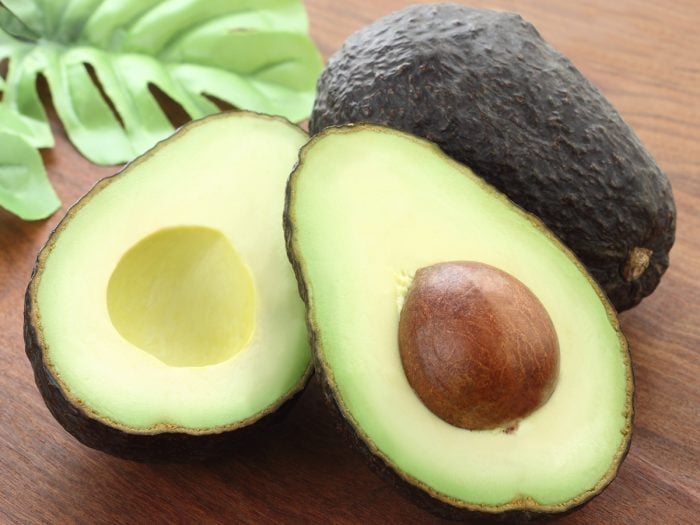Many blog articles have been written about the health benefits of avocado seeds. However, real scientific research around this topic is still amiss. What exactly is known about the usefulness and safety of avocado seeds? Let us discuss that in detail below.
The avocado, or Persea Americana, is a tree from South-Central Mexico. An avocado, also named alligators pear, refers to the fruit of the tree and contains one single seed. As a highly popular type of fruit worldwide, the avocado is one of the greatest export products in several countries including Central and South America. [1]
Table of Contents
Avocado Seeds
The avocado contains a seed which, together with the skin, comprises about 33% of the total weight of the avocado. When eating the avocado, one cuts the fruit in half and removes the seed and skin to use the pulp of the avocado for consumption. The avocado seed is thus considered a waste-product. [7]

Avocado seeds have strong antioxidant properties. Photo Credit: Shutterstock
What Does An Avocado Seed Contain?
Several studies have determined the composition of an avocado seed. One study revealed the presence of alkaloids, saponins, tannins, flavonoids, and cyanogenic glycosides. Also, moisture, crude fat, crude protein, carbohydrate, ash and crude fiber was found. Furthermore, the seed appeared to be a rich source of mineral elements, such as calcium, iron, magnesium, phosphorus, potassium, sodium, and zinc. Anti-nutritional components were also found: oxalate, phytate, saponins, tannins, flavonoids, and cyanogenic glycoside contents.
Other studies described the presence of fatty acids (linoleic, oleic, palmitic, stearic, linolenic, capric and myristic acids), polyphenols (catechin, isocatechin, protocyanidin, flavonoids, tannins and proanthocyanidin monomerics), saponins, glucosides (D-perseit, D-α-manoheptit, D-monoheptulose, persiteol), sterols (β-sitosterol, campesterol, stigma sterol, cholesterol), the amino acid carnitine and two glucosides of abscisic acid.
Can You Eat the Avocado Seed?
Due to the specific taste, easiness to use, and health benefits, the avocado is a commonly used fruit in many households. But what about the avocado seed? As said before, there is insufficient scientific evidence available to make a clear statement whether an avocado seed is edible or not. Older studies showed that avocado seeds are toxic and even cause death in several animals, such as canaries and mice. More recent studies also found a toxic effect, but from what level and for what avocado seed extract it is toxic to humans, is still unknown. Furthermore, some semi-scientific information suggests that avocado seeds are not edible for humans and toxic to animals. The California Avocado Commission shares the same advice: eating the avocado seeds is not recommendable due to insufficient scientific evidence. However, the list of substances that contain an avocado seed and the possible health benefits suggest otherwise. Thus, it is not said that the avocado seed is not edible, but scientific research about the safety and utility of avocado seeds (especially in humans) remains in preliminary stages. [8]
Health Benefits of Avocado Seeds
It is known that the avocado is a fruit with many health benefits. The consumption of the pulp of avocados fits into a wide range of healthy diets. According to the USDA, avocado consists of dietary fiber, potassium, magnesium, vitamins A, B6, C, E and K1, folate, niacin, and many more vitamins and minerals. Since the avocado consists 72% of water and 6.8% of dietary fiber, the caloric density is low. Unlike most fruits, avocados contain very low sugar content. [9] [10]
About the health benefits (and edibility) of avocado seeds is still insufficient scientific evidence. However, there is a growing body of data indicating potential health beneficial effects of avocado seeds. Although mostly performed in animals, several studies investigated the biological effects of avocado seed extracts and showed promising results. Avocado seed extracts were considered to have the following effects: anticancer, anti-inflammatory, antidiabetic, antihypertensive, hypocholesterolemic, antioxidant, dermatological uses, antimicrobial, and insecticidal.
In Mexico, avocado seeds are used in traditional medicine to treat skin rashes, diarrhea, dysentery caused by amoebas, to cure infectious processes caused by fungi and bacteria and for the treatment of asthma, high blood pressure, and rheumatism.
How to Use Avocado Seeds?
Since it is not conclusive whether you can eat avocado seeds or not, you can use the pit for other purposes. A popular use is planting the seed, to grow your own avocado tree. The pulp of the avocado is excellent to use in a variety of dishes, including salads, beverages, and the typical Mexican dip guacamole. It also fits perfectly in a vegetarian or vegan diet.
